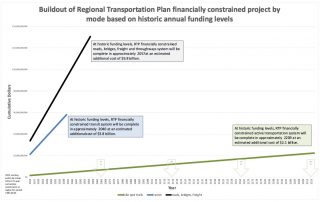
As Oregon legislators start talking about the statewide transportation bill many hope to pass in 2017 (look for some reporting on that soon), others are starting to think locally, too.
We’ve heard from various sources recently that some people in the Portland area are looking toward November 2018 as the right moment for a region-wide bond measure for transportation. The idea is to create a burst of new money for public transit, roadways, biking and walking.
How much of each, you ask? Those negotiations would probably get underway over the next year.
Oregonian reporter Elliot Njus offered some details at the end of an article last month about a public vote in Tigard this fall that will decide whether the city allows or blocks a new light rail line.
The entire Metro region, including Tigard, could be asked in 2018 to vote on a bond measure to pay for a suite of transportation projects, including Southwest Corridor light rail. The measure would likely also include money to fix freeway bottlenecks and for bicycle-pedestrian projects.
Regional leaders have discussed measures modeled after successful efforts in other cities, including a $930 million property tax levy approved by Seattle voters last year.
Bottomly said regional leaders are discussing what such a measure might look like in Portland.
“You have to find that magic point where it’s big enough that people see value but not so big that it’s unaffordable,” he said.
(The hyperlink is our addition.)
Advertisement
This news may not come as a surprise to people reading between the lines of news bits like the time, back in February, when regional government Metro helped pay to bring Denny Zane up for a local talk. He was the political organizer behind Los Angeles County’s big transportation ballot issue.
For people who’d like to raise hundreds of millions of dollars for transportation, regional ballot measures have a lot of promise in Portland. That’s because the metro area is both far more left-leaning than the rest of Oregon and far richer, meaning that a relatively low rate can go a long way.
Because Oregon’s constitution prohibits any fees on auto ownership or use from going to off-road projects, any regional tax that went in part to light rail would probably have to come from property, income, payroll or (gasp) sales taxes. Each would have its own obstacles.
Portland progressives killed a proposed payroll tax hike for bus service earlier this year, saying among other things that an income tax would be fairer. The most recent ballot measure for transit in the Portland area was a property tax bond measure renewal campaign by TriMet, in 2010. The regional transit agency pitched that measure as a way to upgrade its bus fleet for an aging population; it failed 54 percent to 46 percent in the teeth of the recession.
It might also be possible, of course, to craft a measure that would simultaneously tap multiple types of tax for different purposes.
— Michael Andersen, (503) 333-7824 – michael@bikeportland.org
Our work is supported by subscribers. Please become one today.



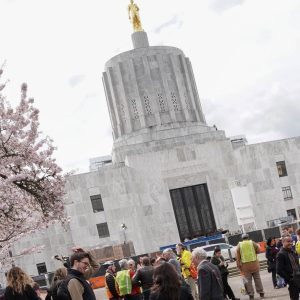
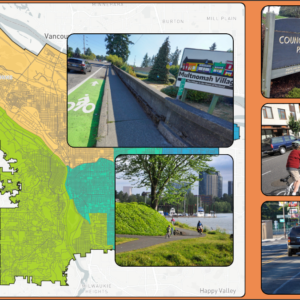
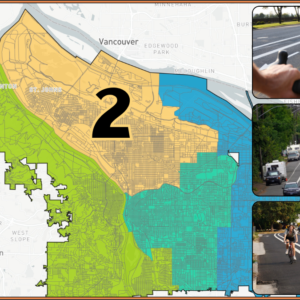
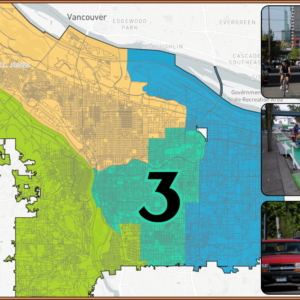
Thanks for reading.
BikePortland has served this community with independent community journalism since 2005. We rely on subscriptions from readers like you to survive. Your financial support is vital in keeping this valuable resource alive and well.
Please subscribe today to strengthen and expand our work.
So, we’re going to use the tax-happiness and incomes or property values of Portland to fund the driving habits of the surrounding area?
I’ll await details, but seems like an easy no vote from here.
Wanna guess how much of this money goes to fund passive transportation that keeps people unhealthy (highways and TriMet)? I’m not going to pay another dollar out of my pocket for anything other than active transportation projects. Car drivers and TriMet can pay for the other stuff themselves!
Cycling/walking and public transport compliment each other, rather than compete.
Rode my folding bike 30 minutes where taking it on the bus costs me 50min starting from less than a mile away from a “frequent service” stop (26min ride assuming zero traffic delay once the bus actually gets to the stop, which is on the direct biking route — yes, the bus averages about 15mph on a 40mph road.) Note also that the bus stops in the bike lane (if you’re lucky enough to have one), makes auto lanes far too wide and forces larger turning radii even on neighborhood streets, and according to the city*, creates way more road wear than driving alone. Public transport could be complimentary to biking, but our bus system is most definitely not.
* “The weight of a standard passenger bus, for example, has as much impact on the pavement as ten thousand automobile trips.” oops https://www.portlandoregon.gov/transportation/article/582395
I have my doubts about that *10k thing, but whatever. The only way sharing routes with a bus is going to help biking is if there’s a treadmill thing on the front of the bus that scoops you up and sets you down at the next stop so you don’t have to leapfrog. I maybe wouldn’t mind a protected bike lane right of a bus lane to get some distance from most of the traffic noise and wind.
It would also smell better if trimet would use B99 biodiesel instead of “the bio is a lie” B20 or whatever blend they’re burning.
Unless you live in some sort of magical place where busses pick you and drop you off in your driveway, it is really unfair to refer to public transit as “passive transportation”.
as a nearly full-time transit commuter my total daily commute is probably less than the amount of time a rich person spends walking around their house…
morning: walk 1 block to bus, walk 2 blocks to transfer downtown, cross street to work…
evening: bus departs from work, cross street to transfer downtown, walk 1 block home…
luckily I also walk during lunch and often when going out to dinner…
TriMet is very much a passive form of transit for me… I spend 80% of it sitting in a bus seat doing crosswords…
I, too, am fortunate to have easy bus service!
Now: what is a three-letter word for a hill or rocky peak? Four-letter D-Day battle location? Three-letter word for a small island? Five letter word for a South American raccoon relative? 😉
crosswords are what urban people did before Pokemon Go?
Ted–Yes! Heh. 🙂 We must give thanks no one walks heedlessly about doing a crossword puzzle, though. No one I know, anyway…
Most research seems to indicate transit users walk about 30% more than those who rely on cars. https://share.kaiserpermanente.org/static/reduceyouruse/transit.html
And transit users spend an average of 19 minutes/day walking to/from transit — a big part of the recommended 30mins/day.
http://www.cdc.gov/healthyplaces/articles/besser_dannenberg.pdf
“So, we’re going to use the tax-happiness and incomes or property values of Portland to fund the driving habits of the surrounding area?”
The median household income in the suburbs is considerably higher than in Portland (65K in Washington and Clackamas, 53K in Portland).
Also, about 60% of the population of the metro area lives in the burbs (excluding Clark County) – it’s not surprising that you would have to consider suburban preferences, if you wanted to craft a bond that would have a chance of passing.
I would support this measure given that not a single dime goes to “fixing bottlenecks” or “freight access” or whatever guise they’re hiding highway expansion behind nowadays. If Oregon law doesn’t allow taxing car ownership for non-car infra, then why should a public transport bond pay for car infra? Can’t we just have one thing that isn’t a handout to destructive driving habits?
It’s almost as if there are people out there with needs and perspectives that are different than yours. Weird, isn’t it?
Drivers have been getting enough handouts; all I’m asking is to fund other modes of transport with equal enthusiasm. No one bats an eye when the state wants to spend hundreds of millions on a new two-mile highway, but ask for a few protected bike lanes and decent public transport and people get all up in arms. Instead of spending money on more highways, why not work to take cars off the road by funding other modes instead?
Instead of automatically directing more funding at highways, we should be asking ourselves if those people who “need” to drive would be better served by making public transport more frequent and convenient. We need to base funding and planning with the goal of reaching a level of service that would get a majority of people out of their cars rather than catering to their existing driving habits.
We need to find a way to spend less on roads. “Let it go to gravel.” might be the answer for some of them.
Portland estimates its $0.10/gal gas tax will fund about 1 mile of complete street per year ($16M/year – $15M/mile.) But we’re not far off since we really only need to build 25ft + bikeway + sidewalk (over 60ft of hard surface) complete streets on the very few through auto routes. By “very few through auto routes”, I mean you can count on one hand how many streets allow you to cross the city in a car in each direction (after we close/divert thousands of points in the grid, of course.)
That said, I’m fine with a $10/gal gas tax at least if we don’t use it to pave the entire city and cook/flood ourselves.
The main problem with a “too-high” statewide transportation revenue source, especially gas tax, is that for any local jurisdiction to use state (or federal) funds, they have to supply “local matching” funds to use the state funds, usually 10.27% for for bike/ped projects (a real bargain!) to 60%-80% for major non-state roadway and bridge rebuilds (a black hole for local revenue). Most actual local matches fall somewhere in between, often 20-30%, depending upon the project type.
At some point, cities use up all their locally-collected transportation revenue on “match” and have nothing available either for new federal or state funding streams (which can appear quite suddenly and unexpectedly) or even for local priorities that don’t have outside funding, such as the East Portland & SW sidewalks from 2012. The City of Portland is getting extraordinarily close to running out of matching funds, even with its new gas tax.
If the state funds are too large, few of those funds will actually go to local projects, but instead will go to ODOT projects, which require no local match at all. So I would expect that most funds will go to highways and interstates, not because ODOT wants it (even if they do), but because the cities won’t be able to use the funds from a lack of available matching funds.
Sorry if this sounds complicated. It is.
So, $10/gal and all we get is a covered bikeway along I5 and I84 across the whole state with a climate-controlled tailwind?
I’d really like to see some effort first to fix the property tax system so that the public could recoup at least some of cost of public infrastructure investments, especially those related to transportation that so directly benefit some individual property owners. One of the many unfortunate legacies of Measure 47/50 from the 1990s is that assessed values are arbitrarily limited and not allowed increase when public investments directly increase property values for particular owners. Thus the increase in property values from new roads, light rail lines, or even bike/ped infrastructure accrues almost entirely to individual property owners, rather than the public at large in the form of more property tax revenue. By increasing fairness in this way (and others), reforming Oregon’s distorted property tax system should make voters more willing to support property taxes in the future in order to make needed public infrastructure investments.
I completely support what you say, except very little property tax revenue actually goes towards transportation projects in Oregon – they are usually used to pay for police, parks, fire protection, housing, etc, with separate non-city property tax levees for schools and libraries. Nothing legally prevents cities from using such revenue for transportation, but it rarely actually happens. However, in most other states, all revenues are mixed together and property taxes frequently are used to pay for transit, streets and sidewalks, such as here in Greensboro NC.
In Oregon, most local transportation infrastructure is paid for with a combination of gas taxes, truck-weight taxes/fees, vehicle registrations, parking revenues, and government grants. Transit is typically paid for through government grants (from fund raised through gas taxes), farebox revenue, payroll (income) tax, and state & federal subsidies for dial-a-ride and rural bus service.
Maybe so but the fact remains that the public would get a greater return on its investment, regardless of its source, if the impact on increased property values would be reflected in assessed values. And all revenue sources are ultimately limited on the capacity of people to pay. I wouldn’t make property tax reform a condition to new investment in a regional bond- the needs are too great- but as Bragdon pointed out in his City Club talk earlier this year- Oregon os long over due in modernizing our transportation finance system the way other States have so that Oregonians have more faith in the fairness and integrity of public investments.
It won’t be a measure to tap multiple revenue sources. Oregon’s constitution requires ballot measures be on a “single issue.” The money could go to multiple projects – that’s a certainty – but only a single revenue source.
Government will never stop trying to pry money out of citizens hands
There is a corporate tax measure coming up. Vote yes on that and use those funds to beef up transit et al
VOTE NO ON ALL MEASURES ON THE BACKS OF CITIZENS
Too bad the citizens voted not to pay full property taxes. This is why we have to use other measures like corporate taxes and bonds.